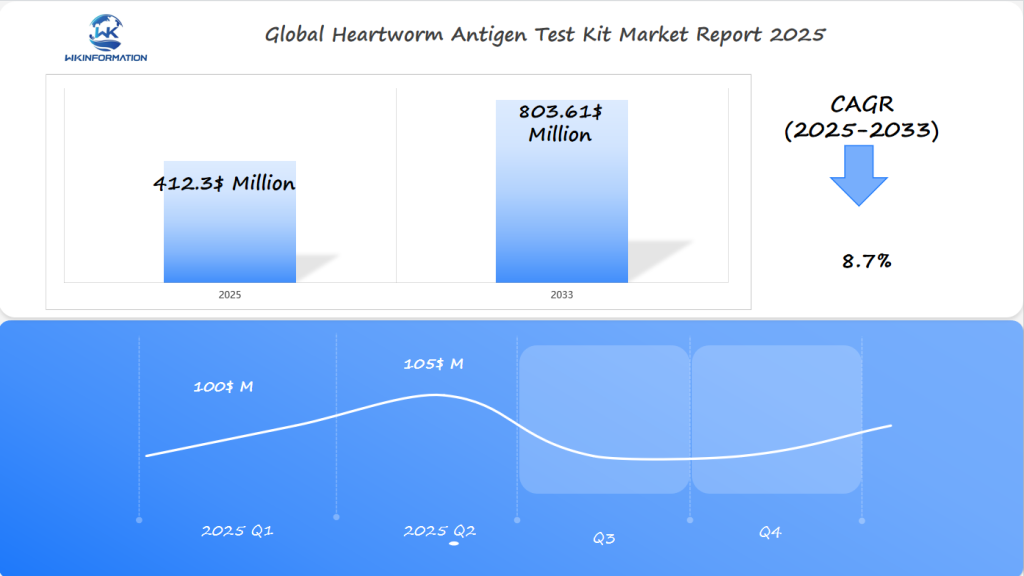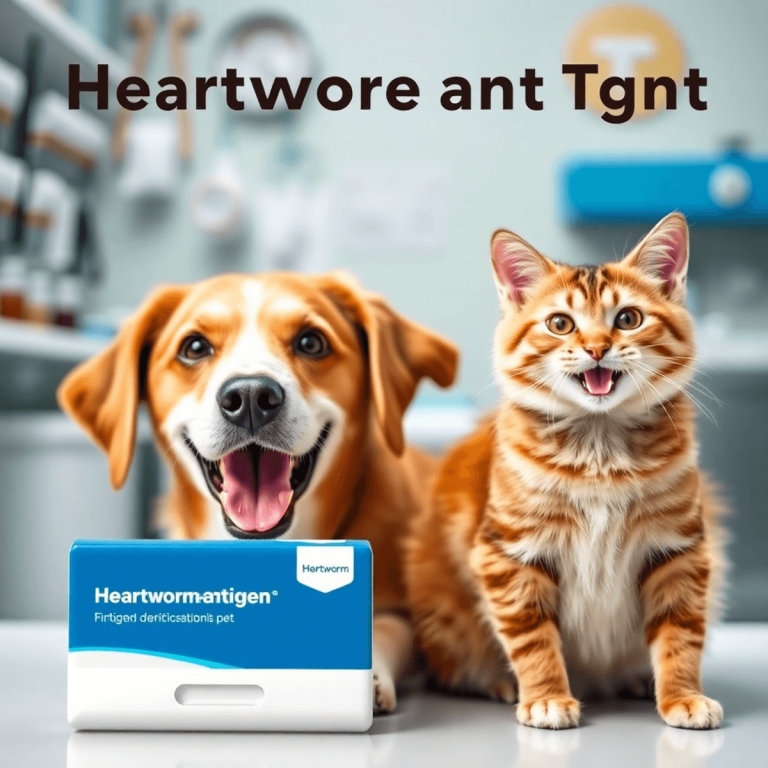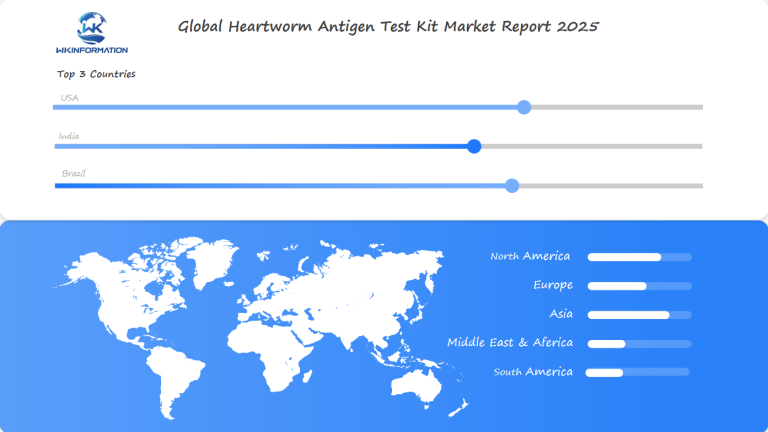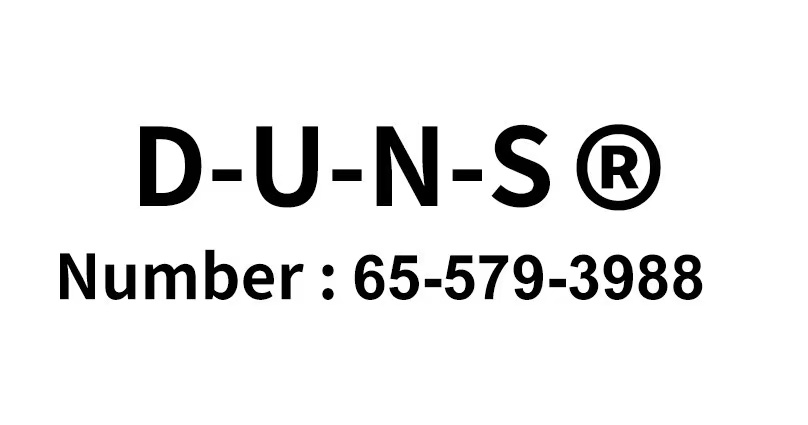2025 Heartworm Antigen Test Kit Market: USA, India, and Brazil Leading Growth Worth $412.3 Million
The heartworm antigen test kit market will reach USD 412.3 million in 2025 and is expected to reach 803.61 million in 2033, with a CAGR of 8.7% from 2025 to 2033, underscores the potential within this sector.
- Last Updated:
Projected Market Insights for Heartworm Antigen Test Kit in Q1 and Q2 of 2025
The Heartworm Antigen Test Kit market in 2025 is projected to reach a total size of $412.3 million, with a compound annual growth rate (CAGR) of 8.7% from 2025 to 2033. In Q1, the market is expected to reach approximately $100 million, driven by growing awareness and ongoing healthcare initiatives in key regions. By Q2, the market is forecasted to expand to around $105 million, reflecting consistent growth momentum.
The USA, India, and Brazil will be the primary drivers of this growth, thanks to their expanding veterinary care sectors, rising pet ownership, and increased spending on pet healthcare. Additionally, advancements in diagnostic technologies and favorable regulatory changes will play a significant role in boosting market expansion. The surge in demand for preventive healthcare in emerging markets like India and Brazil offers substantial opportunities for market penetration and growth.

Upstream and Downstream Considerations in the Heartworm Antigen Test Kit Market
The supply chain for heartworm antigen test kits plays a critical role in determining product availability and pricing. Disruptions in this chain can lead to fluctuations in supply, impacting the market dynamics significantly. The pathway from raw materials to finished products involves multiple stages where each link influences the final cost and accessibility of these kits.
Upstream Considerations
Upstream suppliers have a significant impact on market trends and competition. They supply crucial parts needed for the test kits, which in turn affects the quality and price stability of the products. Having a dependable upstream network helps maintain competitive pricing and consistent product quality. On the other hand, any disruption in this network can have a widespread effect on the market and change the competitive landscape.
Downstream Considerations
The downstream aspect involves distribution channels, retailers, and end-users. Efficient distribution networks ensure timely delivery of test kits to healthcare providers, veterinary clinics, and pet owners. Additionally, understanding customer preferences and demand patterns is crucial for manufacturers and suppliers to tailor their offerings accordingly.
By comprehending these upstream and downstream considerations, stakeholders can navigate the heartworm antigen test kit market more effectively. Building strong relationships with suppliers, optimizing distribution processes, and staying attuned to customer needs are key strategies for success in this industry.
Key Market Trends in the Heartworm Antigen Test Kit Sector for 2025
The heartworm antigen test kit market is experiencing significant growth, driven by several key trends. One of the primary factors is the increase in pet ownership globally. With more households welcoming pets, there is a heightened awareness about pet health issues, including heartworm disease. This growing awareness translates into a higher demand for diagnostic solutions like heartworm antigen test kits.
Preventive care plays a crucial role in this sector’s expansion. As pet owners become more proactive about their animals’ health, routine screenings and preventive measures are prioritized. Heartworm antigen test kits are integral to these efforts, offering veterinarians and pet owners an effective tool for early detection of infections.
In terms of technological advancements, innovations in diagnostic accuracy and speed are transforming the market landscape. New testing methods are emerging that improve both the speed and reliability of results. Technologies such as automated reading devices and novel biomarkers are enhancing the capability of these kits, making them more user-friendly and efficient for veterinary practices.
These trends combine to create a dynamic environment where heartworm antigen test kits are not only essential but also becoming increasingly sophisticated to meet evolving demands in pet healthcare.
Restrictions and Barriers in the Heartworm Antigen Test Kit Market
Regulatory Challenges
Manufacturers looking to enter or grow in the heartworm antigen test kit market face significant obstacles due to regulatory challenges. Different regulations in different regions can slow down product development and raise compliance costs. In the U.S., strict approval processes by regulatory bodies like the FDA ensure that products are safe and effective, but this also means that it takes longer for new innovations to hit the market.
Market Barriers
For distributors, reaching end-users is often complicated by market barriers such as lack of awareness about heartworm disease and the benefits of preventive testing. Mistrust towards certain test kits, possibly due to inconsistent results or limited brand recognition, further complicates distribution efforts. Educating pet owners and veterinarians on the importance of these tests is crucial for overcoming these obstacles.
Product Limitations
Existing heartworm antigen test kits have their own limitations that can prevent widespread use. Problems like false positives or negatives shake confidence in test results, while lengthy testing procedures can discourage busy veterinary practices from making them a part of regular care. Ongoing innovation is vital to improve dependability and effectiveness, making sure that these diagnostic tools fulfill the changing needs of the market.

Geopolitical Influence on the Heartworm Antigen Test Kit Industry
Geopolitical factors have a significant impact on the heartworm antigen test kit industry, affecting both supply chains and market dynamics.
1. Trade Wars
Trade wars can lead to increased tariffs and restrictions, directly impacting the cost of raw materials and finished products. This not only affects pricing strategies but can also create supply chain disruptions that delay product availability.
2. Pandemics
Pandemics add another level of complexity. During global health emergencies, international trade can be greatly affected, causing difficulties in moving goods between countries. These disruptions may lead to shortages or higher costs for heartworm antigen test kits in specific markets.
3. Trade Policies
Trade policies are important because they affect how easy it is to access markets and how competitive businesses can be. When policies are favorable, such as lowering import taxes, it becomes easier for products to be available in the market. On the other hand, when policies are restrictive and make it difficult for foreign manufacturers to enter the market, local players may have an advantage and become more dominant.
For those involved in the heartworm antigen test kit market, understanding these geopolitical influences is crucial. It is important for manufacturers and distributors to stay informed about international developments and adjust their strategies accordingly. This way, they can reduce risks that come with geopolitical events and ensure a steady supply of products and competitive pricing in different markets.
Types of Heartworm Antigen Test Kits and Their Advancements
There are two main types of heartworm antigen test kits available in the market: enzyme-linked immunosorbent assay (ELISA) and rapid tests. These diagnostic methods are crucial for veterinarians to efficiently detect heartworm infections.
1. Enzyme-Linked Immunosorbent Assay (ELISA)
This method is known for its accuracy, using antibodies to identify specific antigens related to heartworms. ELISA kits are widely used because they provide precise results, making them a standard choice in veterinary practices.
2. Rapid Tests
Rapid tests are designed for speed and convenience, offering quick results, often within minutes. These kits are especially beneficial in busy clinical environments where time is critical. While they may not be as precise as ELISA, their simplicity and fast output make them very popular.
Recent technological advancements have significantly improved these test kits:
- Automated reading devices: These devices streamline the testing process by reducing human error and enhancing the accuracy of result interpretation.
- Novel biomarkers: The introduction of new biomarkers has increased diagnostic precision, allowing for earlier detection of infections.
These improvements demonstrate a commitment across the industry to enhance testing efficiency and accuracy. This ensures that both veterinarians and pet owners can depend on timely and trustworthy diagnostics.
Applications of Heartworm Antigen Test Kits in Veterinary Practices
Heartworm antigen test kits are now a vital tool in veterinary medicine for detecting heartworm infections in dogs and cats at an early stage. These kits are invaluable in pinpointing infections prior to the onset of clinical signs, allowing for prompt treatment and control measures.
1. Early Detection
Veterinary clinics commonly use antigen test kits to check for heartworm antigens. This helps veterinarians accurately diagnose infections at an early stage.
2. Disease Prevention Strategies
Integrating these tests into broader pet healthcare strategies is crucial for disease prevention. Regular screening programs help maintain pet health by ensuring that any potential heartworm infections are caught and treated early.
3. Client Education
Educating pet owners about the importance of regular testing contributes significantly to preventive care. Veterinarians often incorporate these discussions into routine check-ups to emphasize the significance of proactive health management.
Heartworm antigen test kits thus serve as a cornerstone in modern veterinary practices, aligning with the industry’s emphasis on preventive care and comprehensive pet health strategies.
Global Market Insights: Performance of the Heartworm Antigen Test Kit Across Regions
Analyzing the regional performance of heartworm antigen test kits helps us understand the global market better. In this section, we’ll take a closer look at how these test kits are doing in different parts of the world, uncovering global insights into trends, challenges, and opportunities.
We’ll also explore specific regional analyses to get a complete picture of how various markets are driving the expected growth of $412.3 million by 2025.
Competitive Landscape in the Heartworm Antigen Test Kit Market
The heartworm antigen test kit market is highly competitive, with major companies constantly working to gain a bigger share of the market. These companies are using strategies like partnerships, mergers, and acquisitions to strengthen their positions.
- Key Players: The market includes well-known companies that are focused on improving diagnostics and expanding their product offerings.
- Competitive Analysis: By studying the strategies of these key players, we can gain insights into the trends that will shape the future of this industry.
In this section, we will provide a detailed analysis of the competitive landscape, highlighting the key influencers in this rapidly changing market.

Trends, Opportunities, and Insights in the USA Heartworm Antigen Test Kit Market
The US heartworm antigen test kit market is experiencing dynamic growth driven by several key trends. A significant factor is the increasing emphasis on preventive veterinary care, as more pet owners recognize the importance of early detection in combating heartworm disease. This has led to a higher demand for reliable and efficient diagnostic tools.
Current trends highlight:
- Rising Pet Ownership: With more households adopting pets, there’s a corresponding increase in the need for heartworm prevention and diagnostic services.
- Technological Advancements: Innovations such as rapid tests with enhanced accuracy are gaining traction among veterinarians, providing quicker results and improving patient outcomes.
- Regulatory Emphasis: Stringent regulations by bodies like the FDA ensure high-quality standards for test kits, fostering trust among practitioners and pet owners alike.
Opportunities abound for both manufacturers and veterinarians:
- Product Differentiation: Manufacturers can use technology to create test kits that perform better than others, meeting the increasing need for accurate diagnostics.
- Veterinary Collaboration: Companies can work with veterinarians through educational programs to raise awareness about the advantages of preventive care and effectively promote their products in clinics.
These trends highlight a strong market where innovation aligns with demand, leading to further growth in the US market.
India’s Growing Heartworm Antigen Test Kit Market: Key Developments
The Indian heartworm antigen test kit market is witnessing remarkable growth, driven by key developments and the rising trend of pet adoption. As more households welcome pets, awareness around preventive care and early disease detection becomes paramount.
Key Developments:
- Increased Pet Ownership: A surge in pet adoption rates across urban and rural areas contributes significantly to market expansion. As families grow their furry members, veterinarians increasingly emphasize the necessity of regular health screenings.
- Market Dynamics: With a growing middle class and changing perceptions regarding pet healthcare, the demand for advanced veterinary diagnostics, including heartworm test kits, is on the rise. This shift not only reflects a deeper emotional bond between pet owners and their animals but also highlights an evolving approach towards animal welfare.
- Technological Advancements: Innovations in diagnostic technologies have enhanced both the accuracy and speed of heartworm testing. These advancements ensure that veterinarians can offer timely treatment options, thus improving overall pet health outcomes.
India’s burgeoning market for heartworm antigen test kits illustrates a dynamic interplay between increasing pet ownership and technological progress, setting a promising trajectory for future growth within the sector.
Brazil Heartworm Antigen Test Kit Market: Forecasts and Growth Areas
The Brazilian market for heartworm antigen test kits is set to grow significantly. With an increase in pet ownership in Brazil, there is a rising need for complete veterinary services, such as heartworm testing. This upward trend creates opportunities for growth in the use of innovative diagnostic solutions.
Forecasting Future Growth Areas
- The rising awareness about heartworm disease among Brazilian pet owners is expected to drive market growth. Educational campaigns and increased access to veterinary services play a crucial role in nurturing this awareness.
- Innovations in diagnostic technology are making test kits more accessible and efficient, which can lead to higher adoption rates among Brazilian veterinarians.
Emerging Trends Influencing Consumer Behavior
- There is a noticeable shift towards preventive healthcare measures for pets, aligning with global trends. Brazilian consumers are increasingly prioritizing pet health, resulting in a greater demand for regular heartworm testing.
- The influence of social media platforms and digital resources has led to a more informed consumer base, eager to invest in their pets’ well-being.
These factors contribute to a promising outlook for the heartworm antigen test kit market in Brazil, anticipating robust growth and transformation in veterinary practices across the region.
The Future Outlook for Heartworm Antigen Test Kits: 2025 and Beyond
Predictions for the Heartworm Antigen Test Kit Market in 2025 highlight significant growth driven by advancements in diagnostic technologies and increasing global awareness of pet health. This upward trajectory is supported by several key factors:
1. Technological Innovations
Expect continued development in test kit technologies within the companion animal health market, enhancing accuracy and speed. Automated systems and novel biomarkers will likely become industry standards, offering veterinarians quicker and more reliable diagnostic tools.
2. Increasing Pet Ownership
As more people around the world become pet owners, the need for preventive healthcare solutions like heartworm antigen test kits will increase significantly.
3. Global Expansion
Emerging markets, particularly in Asia and Latin America, are anticipated to contribute substantially to market growth due to changing consumer attitudes towards pet healthcare.
Long-term implications for pet health management include increased emphasis on regular screening programs. This proactive approach is expected to reduce the incidence of heartworm disease, improving overall animal welfare. The industry’s future outlook suggests a robust expansion phase, with innovation at its core.
Competitive Landscape in the Heartworm Antigen Test Kit Market
Key players:
1. Zoetis —— United States
2. Heska —— United States
3. Idexx —— United States
4. Bionote —— South Korea
5. Woodley Veterinary Diagnostics —— United Kingdom
6. Safepath Laboratories —— United States
7. Dechra —— United Kingdom
8. Biotech Diagnostics —— United States
9. Testsealabs —— China
10. Hangzhou Evegen Biotech —— China
Overall
| Report Metric | Details |
|---|---|
| Report Name | Global Heartworm Antigen Test Kit Market Report |
| Base Year | 2024 |
| Segment by Type |
|
| Segment by Application |
|
| Geographies Covered |
|
| Forecast units | USD million in value |
| Report coverage | Revenue and volume forecast, company share, competitive landscape, growth factors and trends |
The heartworm antigen test kit market is expected to reach $412.3 million by 2025. The focus is on improving diagnostic accuracy and making the test kits more accessible in important regions such as the USA, India, and Brazil.
Technological advancements and increased awareness in pet healthcare are crucial for this growth. Stakeholders need to continuously innovate and strategically position themselves in the market to fully benefit from this thriving sector.
Advancing preventive care strategies is vital to ensure that heartworm antigen test kits remain an essential part of veterinary diagnostics and pet health management worldwide.
Global Heartworm Antigen Test Kit Market Report (Can Read by Free sample) – Table of Contents
Chapter 1: Heartworm Antigen Test Kit Market Analysis Overview
- Competitive Forces Analysis (Porter’s Five Forces)
- Strategic Growth Assessment (Ansoff Matrix)
- Industry Value Chain Insights
- Regional Trends and Key Market Drivers
- Heartworm Antigen Test Kit MarketSegmentation Overview
Chapter 2: Competitive Landscape
- Global Heartworm Antigen Test Kitplayers and Regional Insights
- Key Players and Market Share Analysis
- Sales Trends of Leading Companies
- Year-on-Year Performance Insights
- Competitive Strategies and Market Positioning
- Key Differentiators and Strategic Moves
Chapter 3: Heartworm Antigen Test Kit Market Segmentation Analysis
- Key Data and Visual Insights
- Trends, Growth Rates, and Drivers
- Segment Dynamics and Insights
- Detailed Market Analysis by Segment
Chapter 4: Regional Market Performance
- Consumer Trends by Region
- Historical Data and Growth Forecasts
- Regional Growth Factors
- Economic, Demographic, and Technological Impacts
- Challenges and Opportunities in Key Regions
- Regional Trends and Market Shifts
- Key Cities and High-Demand Areas
Chapter 5: Heartworm Antigen Test Kit Emerging and Untapped Markets
- Growth Potential in Secondary Regions
- Trends, Challenges, and Opportunities
Chapter 6: Product and Application Segmentation
- Product Types and Innovation Trends
- Application-Based Market Insights
Chapter 7: Heartworm Antigen Test Kit Consumer Insights
- Demographics and Buying Behaviors
- Target Audience Profiles
Chapter 8: Key Findings and Recommendations
- Summary ofHeartworm Antigen Test Kit Market Insights
- Actionable Recommendations for Stakeholders

Access the study in MULTIPLEFORMATS
Didn’t find what you’re looking for?
TALK TO OUR ANALYST TEAM
Need something within your budget?
NO WORRIES! WE GOT YOU COVERED!
Call us on: +1-866-739-3133
Email: infor@wkinformation.com
What is the projected growth of the heartworm antigen test kit market by 2025?
The heartworm antigen test kit market is projected to reach $412.3 million by 2025, with significant growth expected in regions such as the USA, India, and Brazil.
What factors influence the supply chain of heartworm antigen test kits?
The supply chain for heartworm antigen test kits is influenced by various factors including:
- Manufacturing processes
- Technology advancements
- Regulatory requirements
- The impact of upstream suppliers on market trends and competition
What are the current trends driving the heartworm antigen test kit market?
Current trends driving market growth include:
- Increasing pet ownership
- Rising awareness about heartworm disease
- Greater emphasis on preventive care in pet health management
Innovations in diagnostic methods also enhance demand for these test kits.
What regulatory challenges do manufacturers face in the heartworm antigen test kit market?
Manufacturers face several regulatory challenges that can hinder their entry into the market or delay the development of their products. These challenges include:
- Compliance with different regulations in various regions
- Addressing safety concerns related to the effectiveness of their products
How do geopolitical factors affect the heartworm antigen test kit industry?
Geopolitical events such as trade wars or pandemics can disrupt the global supply chain for heartworm antigen test kits. Trade policies can also significantly impact product availability and pricing in various markets.
What types of advancements are being made in heartworm antigen test kits?
Recent advancements in heartworm antigen test kits include improved testing efficiency and accuracy through technologies such as:
- Enzyme-linked immunosorbent assays (ELISA)
- Rapid tests
- Automated reading devices
- Novel biomarkers


